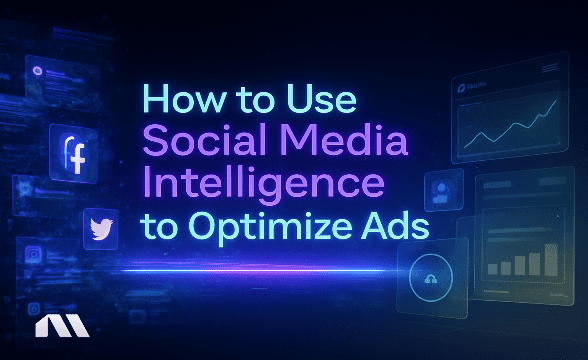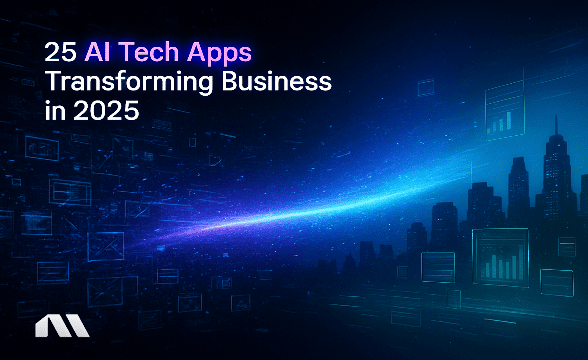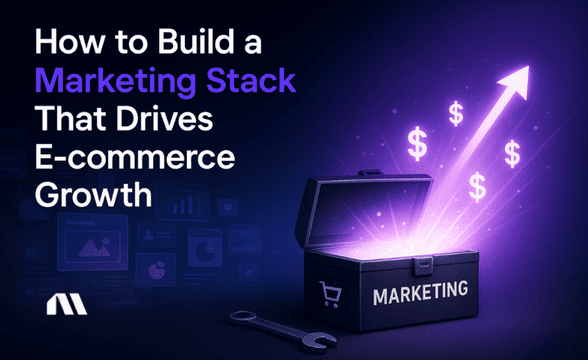Discover the 11 best AI analytics platforms for performance marketing in 2025. Compare features, ROI, and integration complexity to optimize your campaigns.
Ever feel like you're playing detective with your marketing data? One minute you're in Facebook Ads Manager celebrating a 4x ROAS, the next you're in Google Analytics trying to figure out why your attribution numbers don't match, and then you're cross-referencing email platform data that tells a completely different story.
Here's the thing: you're not going crazy, and you're definitely not alone. The fragmented data landscape is the biggest headache facing performance marketers today. But here's what's changing the game - AI analytics platforms designed specifically for marketing needs, not just data visualization.
The global AI market, valued at $391 billion, is exploding with solutions, but most weren't built with performance marketers in mind. After diving deep into the top platforms, I've found 11 that address the attribution puzzles, optimization challenges, and ROI questions that keep us up at night.
What you'll discover:
- 11 AI analytics platforms ranked specifically for marketing capabilities
- Real integration timelines (no more "quick 5-minute setup" lies)
- ROI calculation frameworks that work for marketing teams
- Marketing-specific feature comparisons you won't find anywhere else
What Are AI Analytics Platforms for Performance Marketing?
AI analytics platforms for performance marketing are specialized tools that use artificial intelligence and machine learning to automatically analyze, optimize, and predict marketing campaign performance across multiple channels. Unlike general business intelligence tools that focus on broad data visualization, these platforms understand the unique challenges of marketing attribution, customer journey complexity, and campaign optimization.
Think of them as your data analyst, optimization specialist, and fortune teller rolled into one - but specifically trained on marketing KPIs, attribution windows, and campaign structures.
Core capabilities that matter for marketers:
- Cross-channel attribution modeling designed for marketers
- Real-time campaign optimization recommendations (not just reporting)
- Predictive audience insights based on conversion patterns
- AI-assisted bid management across platforms
- Creative performance analysis with actionable recommendations
The key difference? These platforms don't just show you what happened - they tell you what to do next and help streamline implementation.
How Performance Marketers Use AI Analytics in 2025
Remember the old days? Export data from five different platforms, spend three hours building spreadsheets, analyze yesterday's performance, make optimization decisions based on outdated data, and repeat tomorrow. Exhausting, right?
Here's how 78% of global companies now using AI in daily operations are transforming this process:
Traditional Approach:
- Manual data exports from each platform
- Spreadsheet analysis (hello, VLOOKUP nightmares)
- Delayed optimization decisions
- Reactive campaign management
- Attribution guesswork
AI-Powered Approach:
- Automated data integration across all platforms
- Real-time performance analysis and alerts
- Predictive optimization recommendations
- Streamlined campaign adjustments
- Attribution modeling that connects the dots
The smartest performance marketers I know aren't just using AI in their digital marketing for reporting - they're using it for optimization recommendations that happen faster than any human could analyze. We're talking about platforms that recommend pausing underperforming ads, suggest budget increases on winners, and provide targeting adjustments while you sleep.
Pro Tip: The biggest ROI comes from AI analytics platforms that don't just analyze your data but provide actionable recommendations. Look for optimization capabilities, not just pretty dashboards.
Top 11 AI Analytics Platforms for Performance Marketing
1. Madgicx
What makes it special: Madgicx isn't trying to be everything to everyone - it's laser-focused on advertising optimization for e-commerce brands and agencies. The AI Marketer feature performs daily account audits and provides actionable optimization recommendations with one-click implementation.
Key Features:
- AI Marketer for optimization recommendations
- Cross-channel reporting, including Meta, Google, TikTok, Shopify, and Klaviyo
- Creative performance analysis with AI Ad Generator integration
- Profit-focused bidding strategies
- Real-time budget optimization recommendations
Integration Complexity: Low (2-3 days setup)
Pricing: Starts at $99/month. Free trial available.
Best For: E-commerce brands and agencies managing $10K+ monthly ad spend
ROI Indicator: Users report average 23% ROAS improvement within 60 days
Why performance marketers love it: It's built by performance marketers, for performance marketers. The platform understands that ROAS isn't everything - profit is. The AI optimization is designed to improve performance because it's trained on advertising data, not generic business metrics.
2. Google Analytics 4 with AI Insights
What makes it special: GA4's AI capabilities have evolved significantly, especially for cross-platform attribution and predictive analytics. The enhanced conversions and predictive audiences features are game-changers for attribution modeling.
Key Features:
- Enhanced conversions for better attribution
- Predictive audiences based on conversion likelihood
- Cross-platform attribution modeling
- Automated insights and anomaly detection
- Integration with Google Ads for optimization
Integration Complexity: Medium (1-2 weeks for full setup)
Pricing: Free (paid features in Analytics 360)
Best For: Businesses needing comprehensive web analytics with AI enhancement
3. Triple Whale
What makes it special: Triple Whale addresses the e-commerce attribution puzzle by combining first-party data with AI-powered insights. Their Pixel integration helps recover lost attribution from iOS updates.
Key Features:
- First-party data tracking and attribution
- Creative Cockpit for ad performance analysis
- Profit tracking and optimization
- Multi-touch attribution modeling
- Automated reporting dashboards
Integration Complexity: Low (1-2 days)
Pricing: Starts at $50/month
Best For: E-commerce brands struggling with iOS attribution issues
4. Northbeam
What makes it special: Northbeam's machine learning attribution models are incredibly sophisticated, using first-party data to create accurate customer journey maps across all touchpoints.
Key Features:
- Machine learning attribution modeling
- Customer journey visualization
- Creative performance insights
- Incrementality testing capabilities
- Advanced audience segmentation
Integration Complexity: Medium (1 week)
Pricing: Custom pricing (typically $500+/month)
Best For: Brands with complex customer journeys and multiple touchpoints
5. Adobe Analytics with AI
What makes it special: Adobe's AI and machine learning capabilities (Adobe Sensei) provide enterprise-level insights with sophisticated attribution modeling and predictive analytics.
Key Features:
- Adobe Sensei AI-powered insights
- Advanced attribution modeling
- Predictive analytics and forecasting
- Real-time personalization
- Cross-device tracking
Integration Complexity: High (3-4 weeks)
Pricing: Custom enterprise pricing
Best For: Large enterprises with complex data needs
6. Salesforce Analytics Cloud
What makes it special: Einstein Analytics brings AI to customer data, providing predictive insights that help optimize marketing campaigns based on customer lifetime value and behavior patterns.
Key Features:
- Einstein AI-powered predictions
- Customer journey analytics
- Marketing attribution modeling
- Automated insights and recommendations
- CRM integration for full-funnel analysis
Integration Complexity: High (4+ weeks)
Pricing: Starts at $150/user/month
Best For: B2B companies with complex sales cycles
7. Microsoft Power BI with AI
What makes it special: Power BI's AI capabilities include automated machine learning and natural language queries, making complex marketing data accessible to non-technical team members.
Key Features:
- Automated machine learning insights
- Natural language Q&A
- Predictive analytics
- Custom AI models
- Integration with Microsoft ecosystem
Integration Complexity: Medium (2-3 weeks)
Pricing: Starts at $10/user/month
Best For: Companies already using Microsoft ecosystem
8. Tableau with Einstein Analytics
What makes it special: Tableau's AI features help identify hidden patterns in marketing data and provide automated explanations for performance changes.
Key Features:
- Ask Data natural language queries
- Explain Data automated insights
- Predictive modeling
- Automated dashboard creation
- Advanced data visualization
Integration Complexity: High (3-4 weeks)
Pricing: Starts at $70/user/month
Best For: Data-driven organizations needing advanced visualization
9. Mixpanel
What makes it special: Mixpanel's AI focuses on user behavior analysis and conversion optimization, making it perfect for product-led growth strategies.
Key Features:
- User behavior prediction
- Conversion funnel optimization
- Cohort analysis with AI insights
- A/B testing recommendations
- Real-time user segmentation
Integration Complexity: Low (2-3 days)
Pricing: Starts at $25/month
Best For: SaaS and app-based businesses
10. Amplitude
What makes it special: Amplitude's AI helps predict user behavior and identify the most impactful marketing touchpoints in complex user journeys.
Key Features:
- Predictive user behavior modeling
- Marketing attribution analysis
- Automated cohort insights
- Conversion prediction
- User journey optimization
Integration Complexity: Medium (1 week)
Pricing: Free tier available, paid plans start at $61/month
Best For: Digital products with complex user journeys
11. Klaviyo
What makes it special: While primarily an email platform, Klaviyo's AI analytics provide incredible insights into customer behavior and cross-channel attribution for e-commerce.
Key Features:
- Predictive customer lifetime value
- AI-powered segmentation
- Cross-channel attribution
- Optimization recommendations for campaigns
- Behavioral prediction models
Integration Complexity: Low (1-2 days)
Pricing: Free tier available, paid plans start at $20/month
Best For: E-commerce brands focusing on email marketing ROI
Marketing-Specific Feature Comparison
When evaluating AI analytics platforms for marketing, focus on these capabilities that matter most for performance:
Attribution Modeling:
- Advanced: Madgicx, Northbeam, Triple Whale
- Good: Google Analytics 4, Adobe Analytics
- Basic: Power BI, Tableau
Real-Time Optimization:
- AI Recommendations: Madgicx, Google Ads integration
- Insights & Recommendations: Most platforms
- Manual Implementation: Traditional BI tools
Creative Performance Analysis:
- Specialized: Madgicx (AI Ad Generator), Triple Whale
- General: Most platforms provide basic creative metrics
- Limited: Traditional analytics platforms
Cross-Channel Integration:
- Native: Madgicx (Facebook/Google), GA4
- API-Based: Most enterprise platforms
- Manual: Older platforms requiring custom setup
Pro Tip: Don't get distracted by feature lists that sound impressive but don't address your specific marketing challenges. Focus on AI analytics platforms that excel in your biggest pain points - whether that's attribution, creative analysis, or optimization speed.
Integration Complexity Guide: What to Really Expect
Let's be honest about setup times - because "quick 5-minute setup" is usually marketing fluff:
Quick Setup (1-3 days):
- Madgicx, Triple Whale, Mixpanel
- These platforms prioritize user experience and have streamlined onboarding
- Expect basic functionality within hours, full optimization within days
Medium Setup (1-2 weeks):
- Google Analytics 4, Amplitude, Power BI
- Requires some technical configuration and data mapping
- Full value realized after proper goal and conversion setup
Complex Setup (3-4+ weeks):
- Adobe Analytics, Salesforce Analytics, Tableau
- Enterprise-level platforms requiring IT involvement
- Custom integrations and advanced configuration needed
Pro Tip: Start with AI analytics platforms that integrate directly with your existing ad accounts. The faster you can connect your data sources, the quicker you'll see optimization improvements.
For e-commerce brands, I always recommend starting with advertising-focused platforms like Madgicx or Triple Whale before moving to enterprise solutions. You'll see ROI faster and can always add more sophisticated tools later.
ROI Calculation Framework for AI Analytics Platforms
Here's how to calculate and justify the investment in AI analytics platforms - because companies report 3.7x ROI for every dollar invested in generative AI:
Step 1: Calculate Current Manual Analysis Time Cost
Hours spent weekly on data analysis: ___
Hourly rate of person doing analysis: $___
Monthly cost of manual analysis: $___
Step 2: Measure Optimization Improvement Potential
Current average ROAS: ___
Realistic improvement target (10-25%): ___%
Monthly ad spend: $___
Monthly improvement value: $___
Step 3: Factor in Time Savings for Strategic Work
Hours saved weekly from automation: ___
Value of strategic work vs. manual analysis: $___
Monthly strategic value gained: $___
Step 4: Include Reduced Human Error Costs
Estimated monthly cost of optimization delays: $___
Cost of missed opportunities: $___
Example ROI Calculation:
- Platform cost: $500/month
- Manual analysis time saved: $2,000/month
- 15% ROAS improvement on $20K spend: $3,000/month
- Strategic work value: $1,500/month
- Total monthly benefit: $6,500
- ROI: 1,200% annually
The key insight? Most performance marketers underestimate the cost of manual analysis and overestimate the complexity of AI implementation. The AI analytics platforms that integrate directly with your ad accounts typically pay for themselves within the first month through optimization improvements alone.
Choosing the Right AI Analytics Platform: Decision Framework
For E-commerce Brands ($10K-$100K monthly ad spend):
- Priority: Attribution accuracy, creative analysis, optimization recommendations
- Top Choices: Madgicx, Triple Whale, Northbeam
- Key Factor: Direct integration with Facebook and Google Ads
For Agencies Managing Multiple Clients:
- Priority: Multi-client management, white-label reporting, scalable pricing
- Top Choices: Madgicx (agency plans), Google Analytics 4, Power BI
- Key Factor: Client reporting capabilities and team collaboration features
For Enterprise Brands ($500K+ monthly spend):
- Priority: Advanced attribution, custom integrations, data security
- Top Choices: Adobe Analytics, Salesforce Analytics, Northbeam
- Key Factor: Enterprise-grade security and custom development capabilities
For SaaS/App Businesses:
- Priority: User behavior analysis, conversion funnel optimization
- Top Choices: Mixpanel, Amplitude, Google Analytics 4
- Key Factor: Product analytics integration and user journey mapping
The biggest mistake I see? Choosing based on features you think you need rather than problems you actually have. Start with your biggest pain point - whether that's attribution, optimization, or reporting - and choose the AI analytics platform that addresses that specific challenge best.
Pro Tip: Don't fall into the "enterprise feature" trap if you're not an enterprise. A $50/month platform that solves your attribution problem is infinitely more valuable than a $5,000/month platform with features you'll never use.
Frequently Asked Questions
How long does it take to see ROI from AI analytics platforms?
Most performance marketers see initial optimization improvements within 2-3 weeks as the AI learns your campaign patterns. Full ROI typically happens within 60-90 days. The key is choosing platforms that can provide actionable insights, not just reports. Madgicx users often see ROAS improvements within the first week because the AI provides immediate optimization recommendations for existing campaigns.
Can AI analytics platforms replace my current attribution model?
The best AI analytics platforms enhance rather than replace your existing attribution setup. They provide additional data points and optimization recommendations while maintaining your current tracking. For example, Madgicx works alongside your existing Facebook Pixel and Google Analytics setup, adding AI-powered insights without disrupting your current measurement.
What's the difference between general AI analytics and marketing-specific platforms?
Marketing-specific AI analytics platforms understand campaign structures, attribution windows, and optimization goals that general analytics tools miss. They're built for marketing KPIs like ROAS, CPA, and LTV - not just data visualization. A general BI tool might show you that conversions dropped, but an advanced marketing AI platform will tell you which ad creative to pause and which audience to scale.
How do I justify the cost of AI analytics platforms to my team or clients?
Focus on two key areas: time savings and performance improvements. Calculate the cost of manual analysis time (usually $1,000-$3,000/month for most teams) and the value of ROAS improvements (typically 10-25% for good platforms). Most AI analytics platforms pay for themselves through optimization improvements alone, with time savings as pure profit.
Which AI analytics platform is best for small marketing teams?
Platforms like Madgicx and Triple Whale offer the best balance of powerful AI capabilities with user-friendly interfaces that don't require dedicated data analysts. They're designed for performance marketers who need insights and optimization recommendations, not data scientists who want to build custom models.
Do I need technical skills to implement these AI analytics platforms?
It depends on the platform. Advertising-focused tools like Madgicx require minimal technical setup - mostly connecting your ad accounts and setting optimization goals. Enterprise platforms like Adobe Analytics or Salesforce require more technical implementation. Choose based on your team's technical capabilities and available resources.
Start Optimizing Your Marketing Analytics Today
The big data and AI market projected to grow from $385.89 billion in 2024 to $884.42 billion by 2029 isn't just impressive numbers - it represents a fundamental shift in how smart performance marketers operate. The question isn't whether to adopt AI analytics platforms, but which platform will give you the competitive advantage.
Here's what separates winners from the overwhelmed: choosing platforms that understand marketing, not just data. The most successful performance marketers I work with aren't using generic business intelligence tools - they're using specialized AI marketing tools that speak their language and address their specific challenges.
Your next steps:
- Audit your current analytics setup - identify your biggest data gaps and most time-consuming manual processes
- Choose based on your primary challenge - attribution problems need different solutions than optimization challenges
- Start with a trial - most AI analytics platforms offer 14-30 day trials to test with your actual campaigns and data
- Focus on integration speed - faster setup means quicker time-to-value and ROI
The performance marketers winning in 2025 aren't the ones with the most data - they're the ones with the smartest optimization recommendations. While competitors are still building spreadsheets, you could be scaling campaigns with AI that never sleeps.
Ready to move beyond fragmented dashboards and manual optimization? Madgicx combines AI analytics with optimization recommendations specifically designed for performance marketers managing Facebook and Google campaigns. See how AI can transform your campaign management in minutes, not months.
Stop juggling multiple dashboards and start making data-driven decisions with confidence. Madgicx combines AI Meta ad analytics with optimization recommendations specifically designed for performance marketers managing Facebook and Google campaigns.
Digital copywriter with a passion for sculpting words that resonate in a digital age.







.avif)







